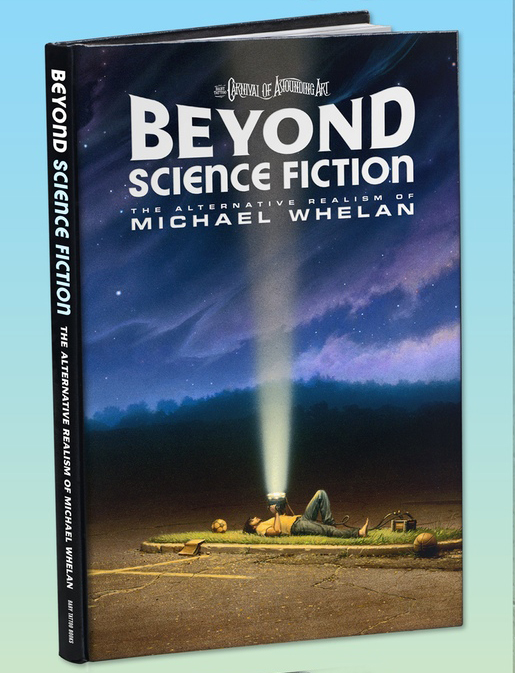(1) WAX TREK. The Orange County Register’s Keith Sharon should get a Pulitzer Prize for the first line of his article “$80,000 later, why this trio gave up their ‘Star Trek’ wax figures, Enterprise replica”:
Mr. Spock’s head cooled in a wooden crate for 10 years before someone noticed something was wrong.
Equally good is the rest of the article — about the fate of the wax Star Trek crew since the defunct Movieland Wax Museum sold its exhibits in 2006.
Steve and Lori had 24 hours to decide whether they wanted to pay about $40,000 for Kirk, Spock, Sulu, Uhura, Dr. McCoy, Chekov and Scott. Or they could buy just one, or just a few.
They went to Don Jose’s restaurant and had margaritas over dinner. They knew other people wanted to buy the individuals in the crew. One guy wanted to put Spock in a bar. Another guy wanted to put Captain Kirk in his house. So they decided to buy them all, to keep the crew together. They made it their mission to save the crew of the Enterprise.
“Let’s protect them,” Steve told Lori.
“We took them home and put them in our dining room,” Lori said.
That’s when it got weird. Steve couldn’t stand the life-like eyes looking at him all the time.
“We put paper bags over their heads,” Steve said.

Steve Greenthal puts on the head of his Captain Kirk wax figure at the Fullerton Airport before donating them to the Hollywood Sci-Fi Museum on Saturday, March 25, 2017. The figures were purchased when the Movieland Wax Museum went out of business. (Photo by Nick Agro, Orange County Register/SCNG)
(2) NOT ENOUGH HAMMER. Ursula K. Le Guin reviews Neil Gaiman’s Norse Mythology for The Guardian and finds it very well-written but wanting in some ways:
Gaiman plays down the extreme strangeness of some of the material and defuses its bleakness by a degree of self-satire. There is a good deal of humour in the stories, the kind most children like – seeing a braggart take a pratfall, watching the cunning little fellow outwit the big dumb bully. Gaiman handles this splendidly. Yet I wonder if he tries too hard to tame something intractably feral, to domesticate a troll.
… What finally left me feeling dissatisfied is, paradoxically, the pleasant, ingratiating way in which he tells it. These gods are not only mortal, they’re a bit banal. They talk a great deal, in a conversational tone that descends sometimes to smart-ass repartee. This chattiness will be familiar to an audience accustomed to animated film and graphic narrative, which have grown heavy with dialogue, and in which disrespect is generally treated as a virtue. But it trivialises, and I felt sometimes that this vigorous, robust, good-natured version of the mythos gives us everything but the very essence of it, the heart.
(3) FROM BUFFY TO BATGIRL. Joss Whedon is in talks to do a Batgirl movie says The Hollywood Reporter.
Whedon is in negotiations to write, direct and produce a Batgirl stand-alone movie for Warner Bros., adding another heroine to the studio’s DC cinematic universe.
Warner Bros. Pictures president Toby Emmerich will oversee the project, along with Jon Berg and Geoff Johns….
Batgirl will be the second female superhero stand-alone in Warner Bros. DCU (Wonder Woman will hit theaters on June 2). Whedon has long been credited as a pioneering voice for female-focused genre fare, having created the hit TV show Buffy the Vampire Slayer two decades ago.
(4) DIETZ ESTATE SALE. Over 300 sf/f collectible books and other items from Frank Dietz’ are for sale on eBay. Dietz passed away in 2013.
He was chairman of the first 14 Lunacons, and was Fan Guest of Honor at the 2007 Lunacon. His activities as “Station Luna,” an effort to record the proceedings of many World SF Conventions, continued for many years. He recorded events at the 1951 Worldcon in New Orleans.
(5) WOTF IN TOWN. Ron Collins reports on Day 2 of the annual Writers of the Future Workshop.
“It’s a little overwhelming,” Andrew Peery told me during a break after the opening session. He meant it in a good way. Peery, from North Carolina, is the 4th quarter first prize winner. The group had just walked through the Author Services Hall of Writers and been given a presentation of past judges throughout the contest’s history. People here have asked me how things have changed in the 18 years since my last visit. One thing that’s different is that the list of judges has gotten a little longer and a little more prominent. It’s very cool to think about.
One thing that hasn’t changed, however, is the purpose of the workshop.
“Our goal in this workshop is to help you train yourself to be a professional writer,” Dave Farland said in his opening remarks. He and Tim [Powers] then covered several topics, focusing on things like how to develop writerly habits, how stories are structured, and how to create and use suspense. And that was just before lunch. Along the way the two of them did a little brotherly bickering about the speed with this things should be done. “If you’re here, we already know you’re good,” Dave said. “But now we want to help you think about producing that good work more quickly.” Tim, followed that up with: “My first drafts take forever and are never any good.” Then he explained why that was just fine by him. I’ve seen that before, but, yeah, it holds up on second viewing! It’s always great to see how creativity is different for two such high-caliber artists.
Other authors have written about Day 1 and Day 3.
(6) EGYPT IN SF. Tim Powers was recently interviewed by Rachel Connor and described his preparation.
Rachel: I was first introduced to your work when I read The Anubis Gates, a historical fiction with time-travel, Victorian corruption and ancient Egyptian folklore. Can you tell us a little about your approach to historical fiction? What is it about a certain period of time that intrigues you?
Tim: A novel for me generally starts with something I stumble across in recreational non-fiction reading. I’ll notice some peculiarity — like Edison working on a phone to talk to dead people with, or Albert Einstein going to a séance — and I’ll start to wonder if a story might not be built around what I’m reading.
If I come across another oddity or two — like Edison’s last breath being preserved in a test tube in a museum in Michigan, or Einstein turning out to have had a secret daughter who disappears from history in 1902 — I’ll decide that this isn’t recreational reading after all, but research for a book.
For The Anubis Gates, it was a note in one of Lord Byron’s letters. He said that several people had recognized him in London at a particular date in 1810, when at that time he was in fact in Turkey, very sick with a fever.
I wondered how he might have a doppelganger, and started reading all about Byron, and his doctor in Turkey, and London at the time, looking for clues
(7) EVERY JOT AND TITTLE. Tom Easton and Michael Burstein’s collaborative short story “Sofer Pete” has been published in Nature
The visitors were crowded against one wall of bookcases, facing a large table on which was stretched a long piece of parchment. An inkwell filled with black ink sat off to the side. A hand holding a traditional goose-quill pen moved over the parchment, leaving rows of Hebrew characters behind it more quickly than a human hand ever could.
Because the hand did not belong to a human. The gleaming metal hand belonged to a humanoid robot seated on the other side of the table. Its name was Pete.
(8) THANKS DAD! Most people know Joe Hill’s father is Stephen King. Here’s what happened when young Joe turned to him for advice….
In the late 1990s I asked my Dad how to write a cover letter for my short fiction submissions. He was glad to help out. pic.twitter.com/BV5x7qbjqf
— Joe Hill (@joe_hill) March 30, 2017
(9) “EVERY WINDOW’S A SEAT”. How much will people pay to be in space for a few minutes? “Jeff Bezos just revealed a mock-up of the spacecraft his rocket company will use to take tourists into space”.
Each launch will rocket a handful of wealthy tourists more than 62 miles (100 kilometers) above Earth on a roughly 11-minute trip.
Near the top of a high arc, the rocket will detach from the space capsule, which will fall toward the ground, granting passengers about four minutes of weightlessness and letting them take in an incredible view of the fringes of our planet’s outer atmosphere.
(10) GHOSTESS WITH THE MOSTEST. The BBC says the animated Ghost in the Shell was good, but the live-action is better.
The Japanese anime Ghost in the Shell isn’t just one of the most acclaimed science-fiction cartoons ever made, it’s one of the most acclaimed science-fiction films, full stop. Conceptually and visually breathtaking, Mamoru Oshii’s cyberpunk detective flick bridged the gap between analogue blockbusters and digital ones, between Blade Runner and The Terminator, with their cyborgs and androids, and The Matrix and Avatar, with their body-swaps and virtual realities. The makers of The Matrix, in particular, were happy to acknowledge that they were following in Oshii’s future-noir footsteps.
The question is, then, is it worth bothering with a belated live-action version? Considering that the cartoon is now a cult classic, and that several other films have taken its innovations and run with them, can a mega-budget Hollywood remake have anything of its own to offer? The answer to both questions is a definite yes.
(11) RELAUNCH. First reuse of a SpaceX recoverable booster — NPR reports:
SpaceX launched a communications satellite from the Kennedy Space Center in Florida using a rocket stage that has already been to space and back. SpaceX is betting that this kind of recycling will lower its costs and revolutionize space flight.
(12) NOT FIVE? At the B&N Sci-FI & Fantasy Blog, Corinna Lawson shares the four rules that tell her “How to Know When It’s Okay to Read a Series out of Order”.
- When the character arcs are resolved by book’s end
In Sins of Empire, there are three leads, and all set out on emotional journeys that are fully resolved by book’s end.
Meanwhile, ASoIaF readers are still waiting to see what happens via-à-vis Jamie Lannister’s redemption arc, whether the Khaleesi will ever seize her birthright, if Tyrion’s suffering will amount to anything, or if Jon Snow will ever stop flailing about and realize who and what he is.
In Bujold’s The Warrior’s Apprentice, a young man who dreams of being a soldier finds more than he bargained for, and, at the end, his journey has a resolution, despite a fair dozen books that follow.
But Bishop’s Others, series, well, readers have been waiting for four books to see what happens with Simon and Meg, and though their patience is rewarded, it took four other books to get there.
(13) REVIEW HAIKU. Aaron Pound begins with a 17-syllable plot summary, then goes on to tell why he loved Kelly Sue DeConnick’s graphic story Pretty Deadly, Vol. 1: The Shrike.
Full review: I must confess that I obtained this book almost solely because it was written by Kelly Sue DeConnick, and at this point I am pretty much willing to at least take a look at anything she writes. Pretty Deadly not only met the high expectations I have for work from DeConnick, it exceeded them. This is, quite bluntly, mythic storytelling that manages to be both epic in scale and simultaneously intensely personal. Told via a combination of tight and brilliant writing from DeConnick and stunningly beautiful and evocative artwork from Emma Rios, this story presents a violent and visceral enigma shrouded in mystery wrapped up in magic, gunfights, and swordplay.
(14) THREE SHALL BE THE NUMBER THOU SHALT COUNT. This is a public service announcement from N.K. Jemisin.
https://twitter.com/nkjemisin/status/847085088512847872
https://twitter.com/nkjemisin/status/847085668283142145
https://twitter.com/nkjemisin/status/847086270694260736
(15) KORSHAK COLLECTION. An exhibit from “The Korshak Collection: Illustrations of Imaginative Literature” will be on display April 10-May 16 at the Albin O Kuhn Library and Gallery on the University of Maryland Baltimore County campus. The collection, now owned by Stephen Korshak, was started by his father Erle Korshak, past Worldcon chair and founder of the imprint Shasta Publishers, and has its own impressive website.
Truly a vision of the fantastic, this exhibition is an amazing exploration of both illustrative art and the evolution of the visual landscape of science fiction and fantasy literature. Featuring work by both American and European artists and spanning more than a century, these vivid illustrations bring to life adventures, beings, and worlds conjured in novels such as Don Quixote, Alice’s Adventures in Wonderland and Tarzan, and pulp magazines including Amazing Stories, Weird Tales, Fantastic Adventures, and Wonder Stories. Accomplishing far more than simply guiding readers in their explorations of new and sometimes bizarre realms, the range and impact of these illustrations is far-reaching.
The exhibition will also include books, pulp magazines, and other items drawn from UMBC’s Rosenfeld Collection, revealing how the illustrations in the Korshak Collection were meant to appear when encountered as artifacts of material culture.
(16) BEYOND ORWELL. The 2084 Kickstarter has funded. The collection —
features 11 stories from leading science fiction writers who were all asked the same question – what will our world look like 67 years from now? The anthology features new and exclusive stories from:
Jeff Noon, Christopher Priest, James Smythe, Lavie Tidhar, Aliya Whiteley, David Hutchinson, Cassandra Khaw, Desirina Boskovich, Anne Charnock, Ian Hocking, and Oliver Langmead.
(17) BOOKS WERE SOLD. This is John Scalzi’s executive summary of The Collapsing Empire’s first week:
So, in sum: Top selling science fiction hardcover in the US, second-best-selling audio book in the US, my highest debut on the USA Today bestseller list, and a TV deal.
That’s a pretty good week, y’all.
Fuller details at the post.
(18) JURY CALL. The Shadow Clarke Jury continues to review its Clarke Award picks.
I put this novel on my shadow shortlist after reading the opening chapters on Amazon, because I was fascinated by the premise: the seemingly inexplicable overnight irruption of masses of full-grown trees into our familiar world. I said, when I explained my choices, that I was intrigued because it reminded me somewhat of John Wyndham’s The Day of the Triffids, in which the world is transformed, first by meteors, which cause mass blindness, and then by the apparently coordinated escape of the triffids, seizing the opportunities afforded by this new blindness. I was curious to see how much The Trees might be in conversation with Triffids more than half a century on.
De Abaitua wrote one of the most complex and difficult novels from 2015, If Then, and I still find myself wondering about it at random times. I was so taken by that strange novel about an algorithmic society in decay—a novel that feels so uneven on the surface, yet so complete in substance—I couldn’t articulate my thoughts well enough to write a decent review. Since then, The Destructives has been on my “most anticipateds” list. Placed on a Clarke award shortlist only once before, for The Red Men in 2008, de Abaitua was unaccountably left off the list for If Then in 2016. The Destructives is the latest piece in this abstract thematic series and, given its scope, it seems primed to make up for last year’s Clarke snub.
Any work of fiction is a formal exercise in the controlled release and withholding of information. What is withheld and for how long is a key element in how we read the work and even how we classify it. To give an obvious example, in a detective story in the classical mode it is essential that the identity of the killer is withheld until the last page, the structure of the novel is therefore dictated by the need to steadily release information that leads towards this conclusion without actually pre-empting it. How successful the novel is depends upon the skill with which this information is managed. If too much is given away so that readers can guess whodunnit too early, the work is adjudged a failure; similarly, if too little is revealed so that the denouement comes out of the blue, it is seen as a cheat and again the work fails.
In a recent article for the Guardian, ‘How to build a feminist utopia’, Naomi Alderman briefly sets out some pragmatic measures for helping pave the way to a world in which genitals, hormones and gender identification don’t matter because ‘everyone gets to be both vulnerable and tough, aggressive and nurturing, effortlessly confident and inclusively consensus-building, compassionate and dominant’. Among suggestions such as trying to establish equal parenting as the norm and teaching boys to be able to express their emotions, she also proposes teaching every girl self-defence at school from the age of five to sixteen. In effect, this is what happens in The Power when it becomes apparent that a generation of teenage girls across the world have developed the capacity to emit electric shocks. The only difference is that this doesn’t just allow the girls to defend themselves against male violence but instead enables them to become the aggressors.
(19) STATUARY GRIPE. Copied to Twitter, a grumpy letter to the editor from a “Disgusted of Tunbridge Wells” type about a proposed Terry Pratchett statue.
I am delighted Mr Eric G Hart is in the minority and does not speak for the people of Salisbury. #GNUTerryPratchett #SpeakHisName pic.twitter.com/wTkHIUkWbZ
— Terry Pratchett ???? ???? (@terryandrob) March 30, 2017
(20) TV IS COMING. HBO’s latest series promo, Game of Thrones Season 7: Long Walk.
[Thanks to John King Tarpinian, rcade, Rob Thornton, Cat Eldridge, Mark-kitteh, David K.M.Klaus, Andrew Porter, Chip Hitchcock, and Carl Slaughter for some of these stories. Title credit goes to File 770 contributing editor of the day Kip W.]




